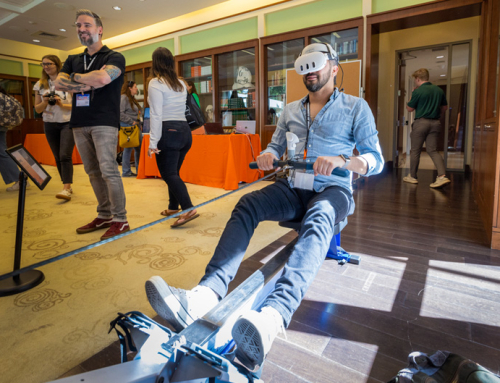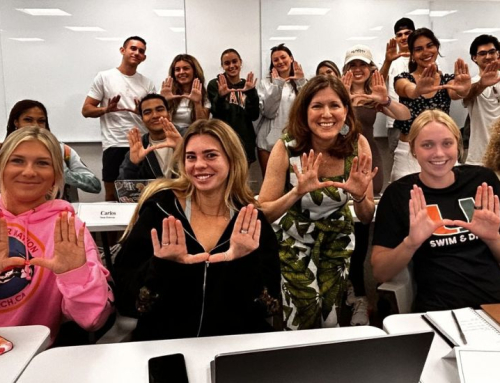The Interactive Canes Team, composed of students from the Interactive Media M.F.A. program at the University of Miami School of Communication, won first place in the AeroTech-Concursive Sea Level Rise Challenge. The contest, sponsored by the Old Dominion University Center for Enterprise Innovation’s (CEI) grant program GOV2COM and the Strome Entrepreneurial Center, asked innovators to devise a mobile application that would efficiently deal with the economic and life threatening consequences produced by sea level rise and flooding in Norfolk, Virginia.
“Norfolk and Miami, like many other coastal communities, face similar challenges due to climate change. Many of these problems are predictable and damage can be mitigated by using proper communication technologies to inform and coordinate the local community,” said Kim Grinfeder, Interactive Canes adviser and director of the MFA in Interactive Media program.
The Interactive Canes responded to the challenge by designing three mobile applications; AfterStorm, Civen, and BPrep.
AfterStorm is a chatbot which simulates human conversations, providing users with crucial information during and after weather emergencies. Civen is an app enabling information sharing in real-time for safety and issue resolution. BPrep is an app developed to streamline communication between businesses and their employees during a weather emergency. The projects were created in Kim Grinfeder’s class, “Designing Innovation,” where students learned to apply human-centered design methods to solve real world problems.
“The students did an amazing job researching and conducting interviews with local law and government officials, business owners, and concerned citizens to learn how the design thinking process can be applied in real world situations,” said Grinfeder.
Sea level rise is a challenge The Interactive Canes are very familiar with, considering that flooding is a part of everyday life in South Florida. In fact, several studies conducted in 2015 and 2016 have identified the region, particularly Miami-Dade County, as having the most at-risk to sea level rising property in the U.S.
“We conducted research and drew from our experiences in South Florida to design the apps. Our win is the result of team work and everyone doing their best,” said Jennifer Hernandez, Interactive Canes’ project manager and M.F.A. in Interactive Media student.
Skip Stiles, executive director at Wetlands Watch, explained that “the University of Miami submissions showed a keen approach…Florida and Virginia face the same challenges from sea level rise and flooding, so it is great that a Norfolk-based competition drew such a strong entry from Miami. This could point the way to more collaborations between our regions.”
The Interactive Canes team competed against submissions by city employees, military personnel, government contractors, and associates of a South African business.
“If we can improve the lives of residents and help the business community and local government save money through the use of new technologies, then we have done our job right,” said Hernandez.
Visit the official webpage to view the apps, University of Miami Interactive Media MFA: Flooding Challenge.






